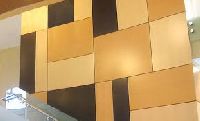
veneer panel
Veneer refers to thin slices of wood, usually thinner than 3 mm (18 inch), that are typically glued onto core panels (typically, wood, particle board or medium-density fiberboard) to produce flat panels such as doors, tops and panels for cabinets, parquet floors and parts of furniture. They are also used in marquetry. Plywood consists of three or more layers of veneer, each glued with its grain at right angles to adjacent layers for strength. Veneer beading is a thin layer of decorative edging placed around objects, such as jewelry boxes.
...more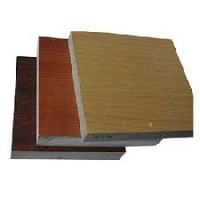
Prelaminated Mdf Board
Eco-friendly, since it uses lops and tops of fast growing species of plantation wood, thus preserving forest cover • Uniform density properties ensure resemblance to natural wood and freedom from knots and twists • Available in a wide range of pastel shades in wood grain and in thicknesses from 8 mm to 25 mm • Available in exterior and interior grades and in variants of single-sided and double-sided laminations. • High internal bond • Strong load bearing panel • High modulus of rupture
...more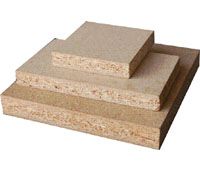
Oriented Strand Board
Particle board, or Particleboard is an engineered wood product manufactured from wood particles, such as wood chips, sawmill shavings, or even saw dust, and a synthetic resin or other suitable binder, which is pressed and extruded. Particleboard is a composite material.
...more
Mdf Wood
MDF is the most versatile of wood panel products. It is a fibre board made from wood or lignocellulosic material refined into fibres and reconstituted with a resin binder carrying elevated temperatures and then sanded to uniform and precise thickness to get best quality plain and prelaminated MDF boards. The main advantage is it’s homogeneous structure with uniform texture and properties throughout. It is easier to machine than natural wood and can be intricately and precisely machined and finished for producing the highest quality of furniture, cabinets and construction components.
...more
Mdf Panel
MDF is the most versatile of wood panel products. It is a fibre board made from wood or lignocellulosic material refined into fibres and reconstituted with a resin binder carrying elevated temperatures and then sanded to uniform and precise thickness to get best quality plain and prelaminated MDF boards. The main advantage is it’s homogeneous structure with uniform texture and properties throughout. It is easier to machine than natural wood and can be intricately and precisely machined and finished for producing the highest quality of furniture, cabinets and construction components.
...more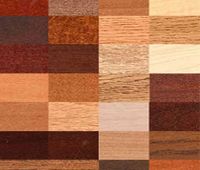
laminated wood
A Laminate is a material that can be constructed by uniting two or more layers of material together. The process of creating a laminate is lamination, which in common parlance refers to the placing of something between layers of plastic and glueing them with heat andor pressure, usually with an adhesive. However, in electrical engineering, lamination is a construction technique used to reduce unwanted heating effects due to eddy currents in components, such as the magnetic cores of transformers.
...more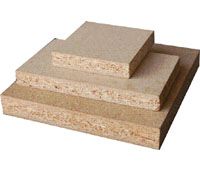
Laminated Particle Board
Particle board, or Particleboard is an engineered wood product manufactured from wood particles, such as wood chips, sawmill shavings, or even saw dust, and a synthetic resin or other suitable binder, which is pressed and extruded. Particleboard is a composite material. Particleboard is cheaper, denser and more uniform than conventional wood and plywood and is substituted for them when appearance and strength are less important than cost. However, particleboard can be made more attractive by painting or the use of wood veneers that are glued onto surfaces that will be visible. Though it is denser than conventional wood, it is the lightest and weakest type of fiberboard, except for insulation board. Medium-density fibreboard and hardboard, also called high-density fiberboard, are stronger and denser than particleboard. A major disadvantage of particleboard is that it is very prone to expansion and discoloration due to moisture, particularly when it is not covered with paint or another sealer. Therefore, it is rarely used outdoors or places that have high levels of moisture, with the exception of some bathrooms, kitchens and laundries, where it is commonly used as an underlayment beneath a continuous sheet of vinyl floor coverings.
...more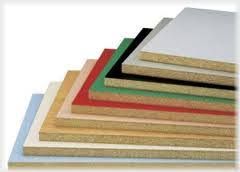
laminated panels
A Laminate is a material that can be constructed by uniting two or more layers of material together. The process of creating a laminate is lamination, which in common parlance refers to the placing of something between layers of plastic and glueing them with heat andor pressure, usually with an adhesive. However, in electrical engineering, lamination is a construction technique used to reduce unwanted heating effects due to eddy currents in components, such as the magnetic cores of transformers.
...more
Fire Resistant Plywood
Plywood is a manufactured wood, made by gluing together a number of thin veneers or plies of softwood or hardwood. It is used mostly in commercial sites, purely because it is a strong durable substance. A common reason for using plywood instead of plain wood is its resistance to cracking, shrinkage, twistingwarping, and its general high degree of strength. Also, plywood can be manufactured in sheets far wider than the trees from which it was made.
...more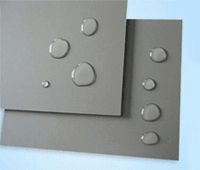
acp sheets
Aluminium Composite Panel (ACP) is a widely-used term describing flat panels that consist of a non-aluminium core bonded between two aluminum sheets. Aluminium sheets can be coated with PVDF or Polyester paint. Aluminium Composite Panels are made of aluminium sheets on both sides with PE core & coated with beautiful polyester resin or with PVDF Kynar 500 fluorocarbon coatings. ACP is very rigid and strong despite its light weight. Aluminium can be painted in any kind of color, and ACPs are produced in a wide range of metallic and non-metallic colors as well as patterns that imitate other materials, such as wood or marble.
...more
acp board
Aluminium Composite Panel has emerged as a material of choice for surface finishing due to qualities like light weight, modem finish, easy installation processes, weather proof coating and evolved workability. Aluminium Composite Panel (ACP) is a widely-used term describing flat panels that consist of a non-aluminium core bonded between two aluminum sheets. Aluminium sheets can be coated with PVDF or Polyester paint. Aluminium Composite Panels are made of aluminium sheets on both sides with PE core & coated with beautiful polyester resin or with PVDF Kynar 500 fluorocarbon coatings.
...more
Timber Products

Wooden Products
Be first to Rate
Rate This